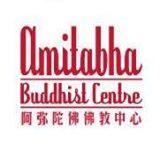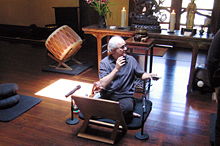The Bodhisattvacaryāvatāra or Bodhicaryāvatāra translated into English as A Guide to the Bodhisattva's Way of Life, is a Mahāyāna Buddhist text written c. 700 AD in Sanskrit verse by Shantideva (Śāntideva), a Buddhist monk at Nālandā Monastic University in India which is also where it was composed.

Geshe Kelsang Gyatso was a Buddhist monk, meditation teacher, scholar, and author. He was the founder and spiritual director of the New Kadampa Tradition-International Kadampa Buddhist Union (NKT-IKBU), a registered non-profit, modern Buddhist organization that came out of the Gelugpa school/lineage. They have 1,300 centres around the world, including temples, city temples and retreat centres that offer an accessible approach to ancient wisdom.

Tricycle: The Buddhist Review is an independent, nonsectarian Buddhist quarterly that publishes Buddhist teachings, practices, and critique. Based in New York City, the magazine has been recognized for its willingness to challenge established ideas within Buddhist communities and beyond.
Lamrim is a Tibetan Buddhist textual form for presenting the stages in the complete path to enlightenment as taught by Buddha. In Tibetan Buddhist history there have been many different versions of lamrim, presented by different teachers of the Nyingma, Kagyu and Gelug schools. However, all versions of the lamrim are elaborations of Atiśa's 11th-century root text A Lamp for the Path to Enlightenment (Bodhipathapradīpa).

Thrangu Rinpoche was born in Kham, Tibet. He was deemed to be a prominent tulku in the Kagyu school of Tibetan Buddhism, the ninth reincarnation in his particular line. His full name and title was the Very Venerable Ninth Khenchen Thrangu Tulku, Karma Lodrö Lungrik Maway Senge. The academic title Khenchen denotes great scholarly accomplishment, and the term Rinpoche is a Tibetan devotional title which may be accorded to respected teachers and exemplars.

The term American Buddhism can be used to describe all Buddhist groups within the United States, including Asian-American Buddhists born into the faith, who comprise the largest percentage of Buddhists in the country.

The New Kadampa Tradition – International Kadampa Buddhist Union (NKT—IKBU) is a global Buddhist new religious movement founded by Kelsang Gyatso in England in 1991. In 2003 the words "International Kadampa Buddhist Union" (IKBU) were added to the original name "New Kadampa Tradition". The NKT-IKBU is an international organisation registered in England as a charitable, or non-profit, company. It currently lists more than 200 centres and around 900 branch classes/study groups in 40 countries. The BBC describe the New Kadampa Tradition as "one of the major Buddhist schools in the UK, founded by the Tibetan-born Geshe Kelsang Gyatso."
Joseph Goldstein is one of the first American vipassana teachers, co-founder of the Insight Meditation Society (IMS) with Jack Kornfield and Sharon Salzberg, a contemporary author of numerous popular books on Buddhism, a resident guiding teacher at IMS, and a leader of retreats worldwide on insight (vipassana) and lovingkindness (metta) meditation.
Martine Batchelor, a former Jogye Buddhist nun, is the author of several books on Buddhism currently residing in France. She and her husband, Stephen Batchelor, work mostly in the United Kingdom and occasionally in the United States. In addition to writing books, she leads meditation groups with her husband that incorporate aspects of Zen, vipassanā, and Tibetan Buddhism. Batchelor also blogs frequently for the U.S.-based Tricycle: The Buddhist Review. She studied Jogye Zen Buddhism for ten years at Songgwangsa with her former teacher Master Kusan Sunim, being ordained as a nun in 1975. Batchelor served as Kusan's interpreter on speaking tours of the United States and Europe from 1981 to 1985, the year she left monastic life, married Stephen Batchelor, and returned to Europe. There she became a member of Sharpham North Community and served as a guiding teacher at Gaia House, both of which are based in Devon, England. She has also led a Buddhist studies program at Sharpham College in Totnes, Devon. MB speaks English, Korean, and French and can read Chinese characters.

Serme Khen Rinpoche Geshe Tashi Tsering BEM is abbot of Sera Mey Monastic University in India. From 1994 to 2018, he was the resident Tibetan Buddhist teacher at Jamyang Buddhist Centre, London.

Glenn H. Mullin is a Tibetologist, Buddhist writer, translator of classical Tibetan literature and teacher of Tantric Buddhist meditation.

Amitabha Buddhist Centre is a Buddhist institution in Geylang, Singapore. It is affiliated with the Foundation for the Preservation of the Mahayana Tradition (FPMT), an international non-profit organisation, founded by Lama Thubten Yeshe.

Robina Courtin is a Buddhist nun in the Tibetan Buddhist Gelugpa tradition and lineage of Lama Thubten Yeshe and Lama Zopa Rinpoche. In 1996 she founded the Liberation Prison Project, which she ran until 2009.

A Dharma talk (Sanskrit) or Dhamma talk (Pali) or Dharma sermon is a public discourse on Buddhism by a Buddhist teacher.
John Makransky is an American professor of Buddhism and comparative theology at Boston College, and a meditation teacher within the Nyingma tradition of Tibetan Buddhism.
Tharpa Publications is a New York-based "major international and multilingual publisher of Buddhist books." It was founded by the Buddhist author and scholar Geshe Kelsang Gyatso. These include basic Buddhist meditation books such as The New Meditation Handbook, books on the Buddhist way of life such as Universal Compassion, books on Buddhist philosophy and psychology such as Heart of Wisdom, and books on Buddhist Tantra. Tharpa Publications is a non-profit corporation that has operated for 25 years and claims to have sold over a million books. Waterhouse adds that the books "are distributed widely and may be seen on the shelves of popular booksellers as well as in university libraries."
Ven. Kaṭukurunde Ñāṇananda Mahathera was a Sri Lankan Bhikkhu and Buddhist scholar. He is best known for the research monograph Concept and Reality in Early Buddhist Thought and the exploratory study The Magic of the Mind. Ven. Ñāṇananda was the abbot of Pothgulgala Aranya, a small forest monastery in Devalegama, Sri Lanka.
Secular Buddhism—sometimes also referred to as agnostic Buddhism, Buddhist agnosticism, ignostic Buddhism, atheistic Buddhism, pragmatic Buddhism, Buddhist atheism, or Buddhist secularism—is a broad term for a form of Buddhism based on humanist, skeptical, and agnostic values, valuing pragmatism and (often) naturalism, eschewing beliefs in the supernatural or paranormal. It can be described as the embrace of Buddhist rituals and philosophy for their secular benefits by people who are atheist or agnostic.
Geshe Rabten (1921–1986) was a Tibetan geshe born in Tibet.
Frank Jude Boccio is a teacher and one of the originators of mindful yoga. He is known both for his teaching in centres across America, and for his 2004 book Mindfulness Yoga: The Awakened Union of Breath, Body and Mind, which describes a practice that combines yoga as exercise and Buddhist meditational practice.










